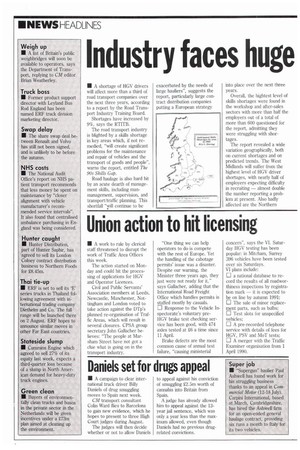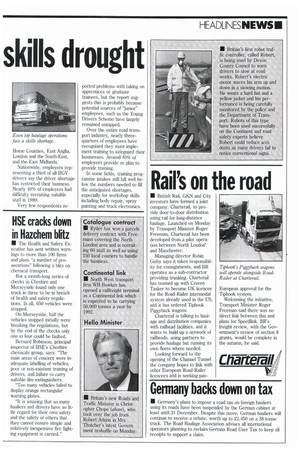Industry faces huge skills drought
Page 6

Page 7

If you've noticed an error in this article please click here to report it so we can fix it.
• A shortage of HGV drivers will affect more than a third of road transport companies over the next three years, according to a report by the Road Transport Industry Training Board.
Shortages have increased by 9%, says the RTITB.
The road transport industry is blighted by a skills shortage in key areas which, if not remedied, "will create significant problems for the maintenance and repair of vehicles and the transport of goods and people", warns the report, entitled The 90s Skills Gap.
Road haulage is also hard hit by an acute dearth of management skills, including manmanagement, supervision, and transport/traffic planning. This shortfall "will continue to be exacerbated by the needs of large hauliers", suggests the report, particularly large contract distribution companies putting a European strategy into place over the next three years.
Overall, the [lightest level of skills shortages were found in the workshop and after-sales sectors with more than half the employers out of a total of more than 600 questioned for the report, admitting they were struggling with shortages.
The report revealed a wide variation geographically, both on current shortages and on predicted trends. The West Midlands will suffer from the highest level of HGV driver shortages, with nearly half of employers expecting difficulty in recruiting — almost double the number reporting a problem at present. Also badly affected are the Northern Home Counties, East Anglia, London and the South-East, and the East Midlands.
Nationwide, employers representing a third of all HGV drivers say the driver shortage has restricted their business. Nearly 40% of employers had difficulty recruiting suitable staff in 1989.
Very few respondents re ported problems with taking on apprentices or graduate trainees, but the report suggests this is probably because potential sources of "junior" employees, such as the Young Drivers Scheme have largely remained untapped.
Over the entire road transport industry, nearly threequarters of employees have recognised they must implement training to safeguard their businesses. Around 40% of employers provide or plan to provide training.
In some fields, training programme intakes still fall well below the numbers needed to fill the anticipated shortages, especially for workshop skills including body repair, spray painting and truck electronics.
















































































































